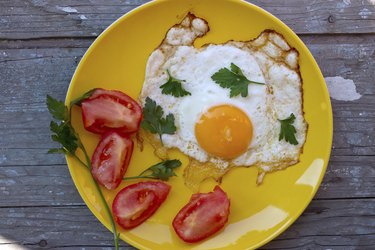
Cooking eggs on a griddle is all in the wrist. Functionally, the only difference in a griddle and a frying pan is the anchored cooking surface. Use proper griddle temp for eggs for best results.
Eggs are a versatile ingredient that is a good source of protein and other essential vitamins and minerals, according to the USDA.
Video of the Day
Video of the Day
To compensate for the unmovable cooking surface when making electric skillet eggs, you have to have a little finesse in your wrist, especially when cooking over-easy eggs. A large offset spatula is among the essential tools for frying eggs on a griddle.
Use a thin-profile metal spatula if you have a cast-iron griddle and a silicone spatula for electric griddles with nonstick surfaces.
Read more: 7 Reasons to Crack an Egg for Breakfast
Try Sunny-Side Up
Step 1: Crack the Eggs
Choose eggs that aren't cracked when making electric skillet eggs. According to the USDA Food Safety and Inspection Service, cracked eggs provide direct access for harmful bacteria.
Crack each egg in a cup. Crack the eggs on their broad side on the work surface so chips of shell won't get in the egg white.
Step 2: Prep the Griddle
Set the cast-iron griddle on the stove and adjust the burner to medium-low. If you have an electric griddle, lightly oil the cooking surface and set it to 325 degrees Fahrenheit — proper griddle temperature for eggs.
Step 3: Pour Eggs Onto Griddle
Pour each egg from the cup onto the griddle surface. Season the eggs with kosher salt and freshly ground black pepper.
Step 4: Add Water and Cover
Pour a small spoonful of water on the griddle and let it bubble for a second. Cover the eggs with a lid.
Step 5: Cook Until Whites Set
Cook the eggs covered for one minute; then uncover. Continue cooking until the whites set, about 30 seconds.
Step 6: Remove and Serve
Slide the offset spatula under the eggs and lift them from the pan. Pry up a corner of the eggs if you need to so you can slide the spatula under them cleanly.
Scrambled Electric Skillet Eggs
Step 1: Heat the Griddle
Heat the cast-iron griddle over medium heat or an oiled or buttered electric griddle to 325 F.
Step 2: Whisk and Season
Whisk the eggs together with about 1 tablespoon of dairy for each and season to taste. Although milk or cream is commonly used, a little sour cream, cultured buttermilk or yogurt not only works, but adds a bit of agreeable tartness that contrasts with the fatty yolk.
Step 3: Add Some Butter
Break off little pieces of cold butter and whisk them into the eggs. The butter pieces lubricate the curds and make the eggs fluffier. You can also add a pinch of baking soda for extra fluffiness if you like.
Step 4: Gently Rotate the Eggs
Pour the eggs onto the griddle. Gently slide the bottom of the offset spatula over the top of the eggs in a circular motion for about 1 minute.
Step 5: Turn the Eggs Over
Turn the spatula over and rake the eggs toward you to turn them over. Turn the heat off on the griddle and let the eggs cook with residual heat until they reach the desired firmness.
The eggs will reach full firmness if you leave them on the griddle for 30 seconds after you turn it off; they will be at their softest if you remove them as soon as you turn the griddle off.
Cook Easy, Medium or Hard
Step 1: Heat the Electric Griddle
Crack each egg in a cup. Place a well-oiled cast-iron griddle over medium heat on the stove or set a well-oiled electric griddle to 325 F.
Step 2: Pour Egg Onto the Griddle
Pour the egg from the cup onto the griddle. Cook the egg until the white sets and turns opaque, about one minute.
Step 3: Slide Spatula Under Egg
Slide the left side of the spatula under the right side of the egg if you're right-handed; if you're left-handed, slide the right side of the spatula under the left side of the egg.
You're not sliding the front of the spatula under the egg as you normally would; you're sliding the entire left or right side of the spatula under the egg.
Step 4: Roll Over Smoothly
Roll your wrist over when you get the spatula under the egg. Don't lift the egg and drop back on the griddle upside down to turn it; you'll break the yolk every time. Simply roll the spatula over smoothly and fluidly with egg on top of it.
Step 5: Cook Until Done
Cook the egg for about 15 seconds after you turn it for over-easy; cook the egg for 30 seconds for over-medium; cook the egg for one minute after you turn it for over-hard.
Consume eggs immediately after cooking for best quality. Discard any leftover eggs that have been at room temperature for more than two hours, as advised by the USDA Food Safety and Inspection Service, to reduce the risk of foodborne illness.
Read more: 9 Things You May Not Know About Eggs
Things You'll Need
Small cups or mugs
Butter or vegetable oil
Baking soda (optional)
Kosher salt
Freshly ground black pepper
Offset metal or silicone spatula
Tip
Use frying rings if you want to give the eggs a clean, round shape. Place a frying ring on the griddle, pour the egg into it and remove the ring after 30 seconds.
Was this article helpful?
150 Characters Max
0/150
Thank you for sharing!
Thank you for your feedback!